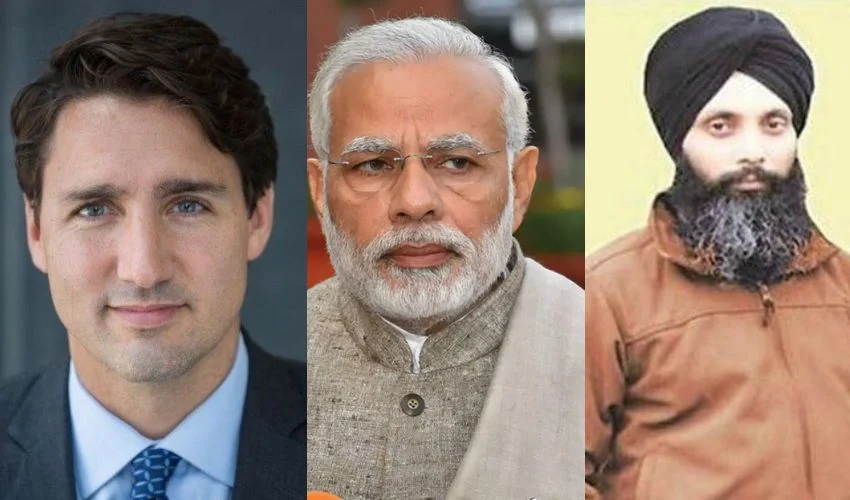Who was Hardeep Singh Nijjar? In his opening remarks to the House of Commons on Monday, Prime Minister Justin Trudeau said there were “credible allegations” of a “potential link” between “agents of the government of India” and the killing of Hardeep Singh Nijjar, a Sikh leader who Trudeau identified as a Canadian citizen.
A diplomat from India was consequently expelled from Canada.
The man who caused the diplomatic uproar was shot dead in June of this year, and the circumstances surrounding his death are still under investigation.
Just before 8:30 p.m. on June 18, Nijjar, 45, was discovered with multiple gunshot wounds inside a car outside the Guru Nanak Sikh Gurdwara.
Two suspects were initially sought by the RCMP’s Integrated Homicide Investigation Team (IHIT), who were described as “heavier-set males wearing face coverings.” They later claimed that the men weren’t acting alone.
Trudeau stated on Monday that authorities were looking into potential connections between the murder and those connected to the Indian government. The allegations have been vehemently denied by the Indian government.
Who was Hardeep Singh Nijjar?
Nijjar, a plumber who immigrated to Canada in February 1997, played a significant role in the fight for Khalistan, the independent homeland for Sikhs in the Indian subcontinent.
But he was sought after by the Indian government because it claimed he was a “mastermind/active member” of the Khalistan Tiger Force (KTF), which it categorizes as a terrorist organization.
Nijjar claimed that gang members had warned him that Indian intelligence agents had put a bounty on his head, according to Global News, which was reported by Nijjar’s friend and fellow Sikh nationalist Gurpatwant Singh Pannun in June.
Nijjar was also informed by the Canadian Security Intelligence Service that he was “under threat from professional assassins,” according to Pannun.
In the Sikh-dominated northern state of Punjab, there was an armed conflict between the Indian government and Sikh separatists in the 1980s and early 1990s. Police in India detained Nijjar’s brother as part of a crackdown on the insurgency. Nijjar himself was taken into custody in 1995.
In a sworn affidavit to immigration authorities, he alleged that he had been tortured and beaten in exchange for information about his brother. He claimed to have cut his hair short, obtained a bribe, and then fled.
Nijjar arrived in Canada in 1997, claiming that Indian police had tortured and beaten him. His refugee claim was turned down in 1998. His immigration records show that he used a fake passport that listed him as “Ravi Sharma.”
In his affidavit, dated June 9, 1998, he stated, “I know that my life would be in grave danger if I had to go back to my country, India.
After his application was turned down, Nijjar wed a British Columbian woman who had sponsored him to immigrate as her spouse 11 days earlier.
He was asked on his application if he belonged to a group that promoted or used “armed struggle or violence to achieve political, religious, or social objectives.”
Despite his “no,” immigration officials rejected Nijjar’s application because they viewed the union as one of convenience. In 2001, Nijjar filed an appeal but was unsuccessful; nonetheless, he later claimed to be a citizen of Canada.
In response to that report, Immigration, Refugees and Citizenship Canada declined to comment to Global News, citing privacy laws.
Nijjar owned a plumbing company in Surrey, British Columbia, and later became a vocal supporter of the establishment of Khalistan, a separate Sikh nation.
He traveled the globe, calling for a vote on Khalistan and the labeling of anti-Sikh violence in India as “genocide.”
Also read: G20: Modi ‘attacks’ Justin Trudeau over pro-Khalistan protests in Canada
A few months after Hindu nationalist and Indian Prime Minister Narendra Modi assumed office in 2014, Indian authorities issued an arrest warrant for Nijjar. Nijjar was referred to as Khalistan Tiger Force’s “mastermind” by New Delhi.
He was charged with taking part in the Punjab cinema bombing in 2007. In 2016, Interpol issued a notice accusing him of being a “key conspirator” in the assault. He was charged with fundraising and recruiting, which Nijjar vehemently denied.
After Nijjar was killed by gunfire, his supporters demonstrated in front of the Indian embassy in Vancouver.
This violent act was anticipated and predictable. For us, it is unacceptable,” Sikhs for Justice director Jatinder Singh Grewal said.
Nijjar reportedly expressed concerns that he was being targeted and that his life was in danger, according to several people who knew him. Threats against Nijjar were reportedly made to him “discreetly,” and other members of the gurudwara have also received threats. Nijjar was reportedly “very vocal” about these claims.
Nijjar served as president of the Guru Nanak Sikh Gurudwara in Surrey, where a referendum he had been working on was held last week. A group that supports a Khalistani nation, Sikhs for Justice, organized the unofficial, non-binding vote.
More than 100,000 people, according to the group, turned out to vote in Surrey.
